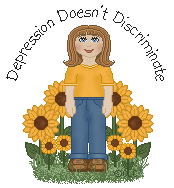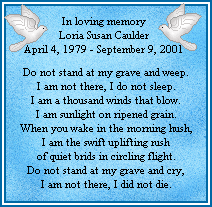 |
|||||||||||||||||||||
|
|||||||||||||||||||||
Today is Tuesday, September 16, 2003. Prior to this date, I have omitted any details about Loria's illness simply because I wasn't sure exactly what to say. But as more people ask 'why?', I have decided today is the day. Many people have misconceptions about depression and if I can help one person to understand it better, then I will have achieved one of the goals that I strive for. Loria suffered from a medical illness known as chronic depression. Call it a mental illness if you like. It is not a personal weakness, it is an illness. She wasn't crazy, she was highly intelligent -- with a fear of being labeled 'crazy'. People don't 'get over' depression and they don't 'grow out of it'. It's not a simple case of 'the blues'.
Loria suffered
extreme mental anguish that led to even physical pain on most days
of the final year and a half of her life.
The effects of depression on a person's life can be devastating, life-altering and as we have been so unfortunate to suffer through -- deadly. As we know from Loria's experience with this killer illness, a person can have stability in their life today but face unparalleled turmoil tomorrow -- one good day, one bad day, one good day, two bad days, and so on. Symptoms or warning signs9 can include but are not limited to the following:
The one step forward, two steps backward track of progression can cause a person to feel even worse. From feelings of inadequacy and inferiority to hopelessness, the range of emotions that a depressed person may suffer can be insurmountable in their eyes -- a mountain too high to climb. Unless they receive the proper professional treatment for their illness, the consequences can be tragic. In addition to the ultimate tragedy -- suicide -- depression can render a person disabled in their job, school, family or social life. To simply get out of bed in the morning can be comparable to climbing Mt. Everest. Treatment for depression usually includes counseling and can include medication (anti-depressants). A trusted counselor is important to the depressed patient. A person seeking treatment must feel comfortable in a patient-counselor relationship. But don't settle for anything less than a qualified counselor -- don't be embarrassed to ask for credentials and references. A medical doctor must be seen for medication to be prescribed. The patient should expect the doctor to be involved with their treatment, asking questions and responding to your questions when they are asked. As the patient, you have the right to ask questions and have them answered. The number one priority is your mental wellness. The most important thing that I can tell you is that if you question your treatment -- or lack of treatment -- seek a second opinion. If you don't 'feel right' with your doctor or counselor, it's your right to see someone else. Don't be intimidated and don't let one bad experience deter you from seeking a different professional. You should be the most important person in your life. Unless you have been directly affected by depression, either as a sufferer, or as a family member or friend of someone who suffers from depression, it can be difficult to comprehend the disastrous consequences that depression can cause. We faced the most tragic of all consequences -- the suicide of our loved one -- my child. Out of this tragedy, the memories of my daughter intertwined with her spirit -- that I know is with me -- continues to touch me, leading me to more knowledge about depression every day. If I didn't share our experience, Loria's death could be in vain. And I simply will not accept that! Loria was being treated for her illness. She did all the right things. She committed to a treatment plan, she took her medication even while suffering severe side effects, she signed a release or waiver of confidentiality for me to be involved in her treatment and informed of her progress, and she participated in intensive counseling as often as four days per week during the 30 days preceding her suicide. She also invited her sister and myself to participate in her counseling sessions. So what went wrong? Why? Loria did not wake up on 9/9/01 and say "I'm having a bad day and I'm gonna kill myself." She did not commit impulsive suicide. Far from it. She wanted to live and she had everything to live for. But depression can be a killer illness when not treated properly. I have my own opinions about what went wrong, but for now I must keep them to myself. One day ... one day I will tell the world. ~ Loria's Mom Forever
Page originally published
on 9/13/03; statistics updated on
04/04/2008.
Photograph from
stock.xchng. |






